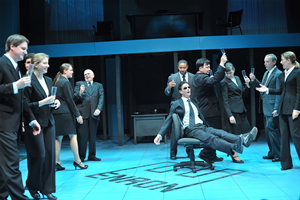Between Wednesday’s Greensboro Opera/EMF opening event, Friday’s Youth program, and Saturday’s diverse evening of old and new, the Eastern Music Festival was batting three-for-three for a stunning way to open the summer.
At first sight, there seemed to be no patriotic repertoire on the Independence Day program, but looking a bit more closely, and with the help of Maestro Gerard Schwarz‘s comments from the podium, we noticed that the first piece, Eugene Goossens‘ Jubilee Variations, is comprised of variations written by American composers: Aaron Copland, Howard Hanson, William Schuman, Roy Harris, Paul Creston, Walter Piston, and Ernest Bloch (naturalized 1924), among others.
Goossens, an English born composer-conductor, was at the end of his tenure with the Cincinnati Symphony when he commissioned ten American composers to write variations on a theme he himself provided. These were named after their composers, each of whom spoke distinctly and had full freedom to do whatever they wanted, other than the fact that Goossens provide them the key for each.
Maestro Schwarz’s programming of Goossens work was daring, and the performance was rewarding (the piece earned a standing ovation – the first time in my short lifetime a concert opener has received such praise). Hearing it was akin to hearing a world premiere: after all, it’s only been conducted four times, once by Goossens, and three by Schwarz. The concert was thus off to an exciting start.
Enter Stefan Jackiw, a young violinist based in New York. Poised and professional, Jackiw and the orchestra engaged in the musical game of cat and mouse known as Mendelssohn’s Violin Concerto in E minor, Op. 64.
The work is equally challenging for the soloist and the orchestra, but Jackiw navigated Mendelssohn’s cadenzas with such power he lit up the stage like, well, a Fourth of July firework. Schwarz and the orchestra stood out with their fluidity, connecting each movement effortlessly and giving Jackiw enough space to shine while they themselves shone in the exposed sections. The performance by both led to seven (count it – seven!) recalls before Jackiw serenaded the audience with a solo encore.
Following an intermission, during which audience members chattered about how excited they were for part two, the second half opened with Alan Hovhaness’ “Prayer for Saint Gregory,” one of the composer’s better known short works. Chris Gekker provided a luminous solo trumpet in the piece, giving the audience moments of serenity before diving headfirst into Tchaikovsky’s monumental Fourth Symphony.
The Fourth Symphony places Tchaikovsky among the great symphonists, in the ranks of Beethoven, Dvořák, and Shostakovich (the latter having been influenced by Tchaikovsky’s 4-6th symphonies). One of the main reasons is because, at this point in his life, Tchaikovsky had turned to music to express the inner turmoil he was experiencing.
“Fate” is the key word of the symphony. Much like Beethoven’s Fifth, which musicalized the “Fate” motif in its main three-note theme, the Fourth Symphony expresses Tchaikovsky’s questioning of his future as a composer and human being. To me, the symphony plays to intense imagery such as returning home, finding everything you love destroyed, and retreating into a dream world in order to cope.
This is probably the most often heard of his symphonies. His varying styles in each movement create moods of reflection for the audience to experience. The first movement, the embodiment of the “Fate” theme, plays out like a good drama, while the third movement is a funny, darkly ironic pizzicato dance that may well make you laugh. At the end of the symphony, joy triumphs over despair; perhaps this is Tchaikovsky deciphering the fact that humanity, after all, is good.
Schwarz’s control over the orchestra was most prominent in this symphony. The orchestra’s passion and understanding of the piece was clearly evident in every note they played. No section faltered, the brass particularly shining in their exposed moments, making Dana Auditorium shake from their powerful playing.
It is hard to say anything more about the performance, simply because it was so earth-shatteringly good, to say anything further still wouldn’t do it justice. There is something magical happening in Greensboro right now, and it is all thanks to Gerard Schwarz and his daring programming. EMF has hit a home run with this first week of programs. One patron, leaving, said enthusiastically, “If tonight was this good, how can it get any better?”
I’m sure they’ve got some surprises up their sleeves to answer that question.
The EMF continues through August 1. For details, see our calendar.











